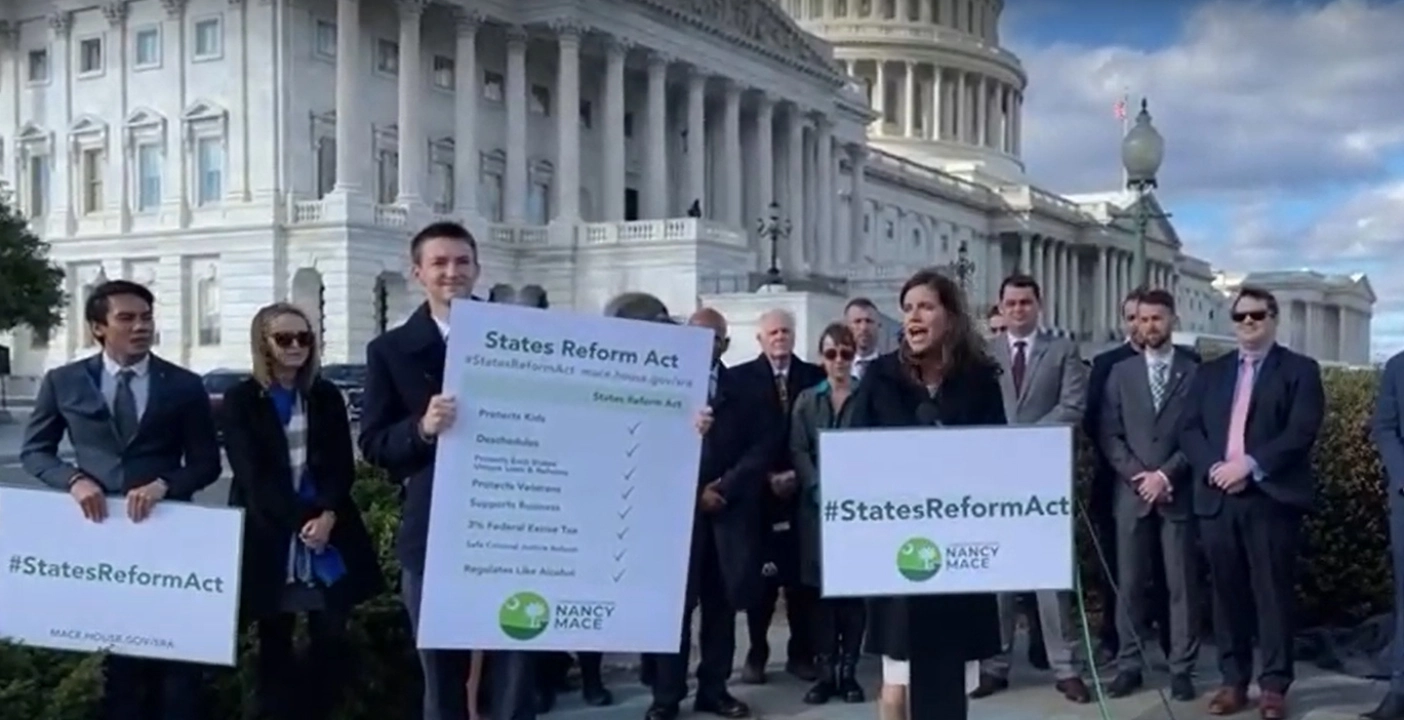Friday’s passage of the MORE Act – to legalize marijuana at the federal level – could set the stage for a new round of bipartisan talks on MJ reform.
At least, that’s the hope of freshman U.S. Rep. Nancy Mace.
Mace, a South Carolina Republican, made a splash last year when she became the face of a new GOP push to remove marijuana from the list of federally controlled substances and let the states take the lead on regulating the cannabis industry.
But since her bill – the States Reform Act – was introduced in November 2021, it has languished in 12 committees and seven subcommittees without a hearing.
By contrast, the full U.S. House of Representatives on Friday passed the MORE Act for the second time in the chamber’s history.
The vote split mainly along party lines, with only three GOP lawmakers supporting the legislation; Mace voted against it.
The MORE Act – known formally as the Marijuana Opportunity, Reinvestment and Expungement Act – faces an uphill battle in the Senate.
For her part, Mace believes that House passage of the legislation could be a starting point for building a bipartisan consensus around a descheduling bill that would remove marijuana from the Controlled Substances Act.
And she’s eager to be part of the marijuana breakthrough in Washington DC, despite an upcoming primary where she’ll face a Trump-endorsed candidate and weathering attack ads from a new political action committee that’s been trying to use her cannabis support against her.
MJBizDaily spoke with Mace last Thursday, on the eve of the House vote on the MORE Act.
She shared that one of her Democratic counterparts on the House Oversight and Reform Committee has promised to hold at least one hearing on her States Reform Act.
What’s the status of the States Reform Act (SRA)?
We are waiting for the MORE Act to pass out of the House. The next step with the SRA will be a hearing. And we’re going to do that in the (House) Oversight (and Reform Committee).
We’ll have a hearing in the Subcommittee on Civil Rights (and Civil Liberties). I’m the ranking Republican, and (U.S. Rep.) Jamie Raskin is the chairman, but that’s where we’ll have our first hearing.
Once the MORE Act passes, we’ve talked to Democrats who do want to get on board with SRA, and I want to make sure we’re playing chess and not checkers and moving forward on legislation that we believe will be bipartisan and will have a chance of success.
So often we have so many bills that get voted on in one chamber, but not the other, which makes it a stalemate. This is a multibillion-dollar industry problem.
It is not going away. And we need to have a bipartisan solution.
Are you a social equity cannabis license holder or applicant?
The MJBizCon team is now accepting 2023 Social Equity Scholarship Program applications.
The mission of this program is to provide social equity cannabis license holders or applicants access to the #1 global cannabis industry conference + tradeshow in Las Vegas.
Who can apply?
- Students currently enrolled in a cannabis-related program at an accredited university or college.
- Cannabis executives at licensed social equity cultivation, extraction/processing, retail, manufacturing/brand businesses (or awaiting application approval).
Don’t miss out on this potentially life-changing opportunity.
Apply to attend MJBizCon today – The application period will close on July 24!
What kind of reception have you received from your congressional colleagues in Congress?
Very positive reception.
And for those that pushed back to some degree or another, it’s really about providing information and data and saying why this does what it does, there’s so much misconception just about cannabis reform in general, with folks who oppose it.
For example, I’ve had a couple of Republicans push back on expungement (of marijuana-related criminal records), but it’s really about educating people about what the bill does.
You’ve got some that are saying, “Well, this legalizes cannabis at the federal level;” it doesn’t actually do that, because it allows states to have the control and power.
You only really get Republicans on board for cannabis reform at the federal level by ensuring that states are in control, very much like alcohol, and my bill treats cannabis like alcohol.
You don’t need SAFE Banking with SRA. And with the MORE Act the way that it is, it’s not going to be bipartisan. It will not pass the Senate.
If you don’t expect the MORE Act to pass the Senate, what’s your sense of the chances of marijuana reform in Congress?
You’ve got to have both sides at the table or this isn’t going to work. This is a time to build consensus.
How do we incentivize states not to market and advertise to those under 21, except for those that have severe medical conditions? Labeling and packaging? Ensuring that taxes are low? These are things I think we can all agree on.
When it comes to social equity, with the states having the power, they can do what they want in that regard, and it’s not forced in any way at the federal level.
If you force those things, then you’re not going to get bipartisan support. You’re going to get a stalemate, and it’s not going to move forward.
It’s not enough to have a vote. We have to push the ball forward.
There’s a balance there between the federal government’s role – which is get out of the way of the free market and allow states to decide what they want to do – and that’s where you find I think that sort of consensus, that center that offers something for both sides.
Otherwise, it’s not going to go anywhere.
Have you spoken with GOP leadership about the SRA? What has Minority Leader Kevin McCarthy said about it?
We’ve had staff-level conversations.
I’ve been really focused on talking to Republicans and educating them on it.
I did have some from leadership, actually two, a couple of them that want more information.
For some people on my side of the aisle, they want to wait until their primaries are over.
I get that, because to me, this is not controversial. But for some people in Washington, still, it’s controversial. So I’m fine with waiting a little bit of time.
My goal is, let Democrats pass the MORE Act and then work to build some consensus, have a hearing, hear what they would like to have in a bill like this.
There would be some (Republicans) that will want to amend it as well.
And I want to make sure that I’m working in that direction, to provide a pathway, a framework for real true reform at the federal level.
What do you think will change for you and for the SRA’s chances of passage if Republicans retake the House in November?
I believe that we will (retake the House).
And I want to start laying the groundwork now and start to have those conversations.
It will be after the primaries are over, talking with my leadership to understand better where they are. “Can we do this in a comprehensive way? If not, in what part and parcel can we do it, and in what order?”
We’ve got to figure out what’s going to pass muster in court and constitutionally.
Once all these primaries are over, it’ll be my goal with my team to get leadership with the Cannabis Caucus and say, “OK, we stole this issue from the other side. But how do we work together with both sides to actually do something?”
And to do something, it’s got to pass both the House and the Senate.
We’ve had encouraging outreach from both parties in the Senate.
Several offices have reached out with regard to our bill, expressing interest in it.
And that is another really encouraging sign at this juncture. Like, names we all know, household names.
I won’t say who they are just yet. But really big deal.
Do you feel like you’ve become a political target because of the SRA? There is a new super PAC running ads against you because of the bill.
No, because in my particular district, medical cannabis reform is being led by Republicans.
It’s actually Republicans in my district that are leading on the Compassionate Care Act in the state of South Carolina.
And I polled it extensively in my district, in a general election, it’s a 70-30 issue.
And in a Republican primary, I polled the most conservative voters in my district, and almost two-thirds of them support the rights of states to do what they want on cannabis.
This genie is not going back in the bottle. I live in reality, not fiction.
And I know that this can save a lot of lives and can do so much good and, in fact, save the federal government money at the same time.
It’s a win-win-win all the way around for conservatives. It can be a huge win for everybody.
How optimistic are you that some kind of cannabis reform bill – whether it’s the SAFE Banking Act, or the SRA, or the MORE Act or something else – is going to get through Congress this year? Or next year?
I think it’s going to be very tough. I hear the House is going to do SAFE Banking again.
I don’t know what the holdup is in the Senate. And, for some people, it doesn’t go far enough. And that’s where I just feel confused.
We have a 50-50 Senate and a bare majority in the House. Why we’re not doing the work to build consensus on so many issues – whether we’re talking about the supply chain or cannabis or inflation – it’s very one-sided right now.
This interview has been edited for length and clarity.
John Schroyer can be reached at john.schroyer@mjbizdaily.com.





